Navigating the crowded market of ecommerce SEO tools can feel overwhelming, especially when the success of your online store hinges on visibility and traffic. Simply having great products isn't enough; you need to ensure potential customers can find them through search engines. This requires a strategic approach to everything from keyword research for product pages to technical site health, and the right software stack is essential for executing that strategy effectively. Without proper tools, you're essentially operating in the dark, guessing which keywords to target, unsure of technical issues hurting your rankings, and blind to what your competitors are doing successfully.
This guide cuts through the noise. We provide a comprehensive, in-depth analysis of the top ecommerce SEO tools available today, moving beyond generic feature lists to give you actionable insights. You'll find a detailed breakdown of platforms like Ahrefs, SEMrush, and specialized tools like Helium 10, complete with real-world use cases, honest pros and cons, and clear pricing information. We’ll show you not just what each tool does, but how to apply its features specifically to an ecommerce environment to drive tangible results, like increased organic traffic and sales.
Each review includes screenshots and direct links, allowing you to evaluate each option quickly. We've structured this resource to help you confidently select the best toolkit for your specific needs, whether you're a small business owner, an agency professional, or part of an in-house marketing team. While these tools provide the mechanism for optimization, understanding the core principles is equally important. For a deeper dive into the foundational elements that these tools support, consult the ultimate guide to ecommerce SEO best practices. Now, let's explore the tools that will transform your store's search performance.
1. That's Rank
Best For: Real-time, simplified rank tracking and competitor analysis.
That's Rank earns its top spot by delivering exactly what e-commerce store owners need most: clean, daily, and actionable data on their keyword performance without overwhelming complexity. It’s an exceptionally focused platform that excels at its core mission of rank tracking, making it one of the most practical ecommerce SEO tools for businesses that prioritize monitoring their Google rankings for product, category, and brand-related terms. Its streamlined interface strips away the noise, presenting crucial data in a way that is immediately understandable, even for those without a deep SEO background.
The platform's power lies in its automated daily updates. While many tools update weekly or require manual refreshes, That's Rank ensures you have fresh data every single morning. This is invaluable for e-commerce, where a sudden drop in rankings for a high-value keyword like "women's running shoes" can directly impact sales. The ability to track unlimited domains and keywords (on paid plans) means you can monitor not just your own store but also keep a close eye on your top three or four competitors, all from a single dashboard.
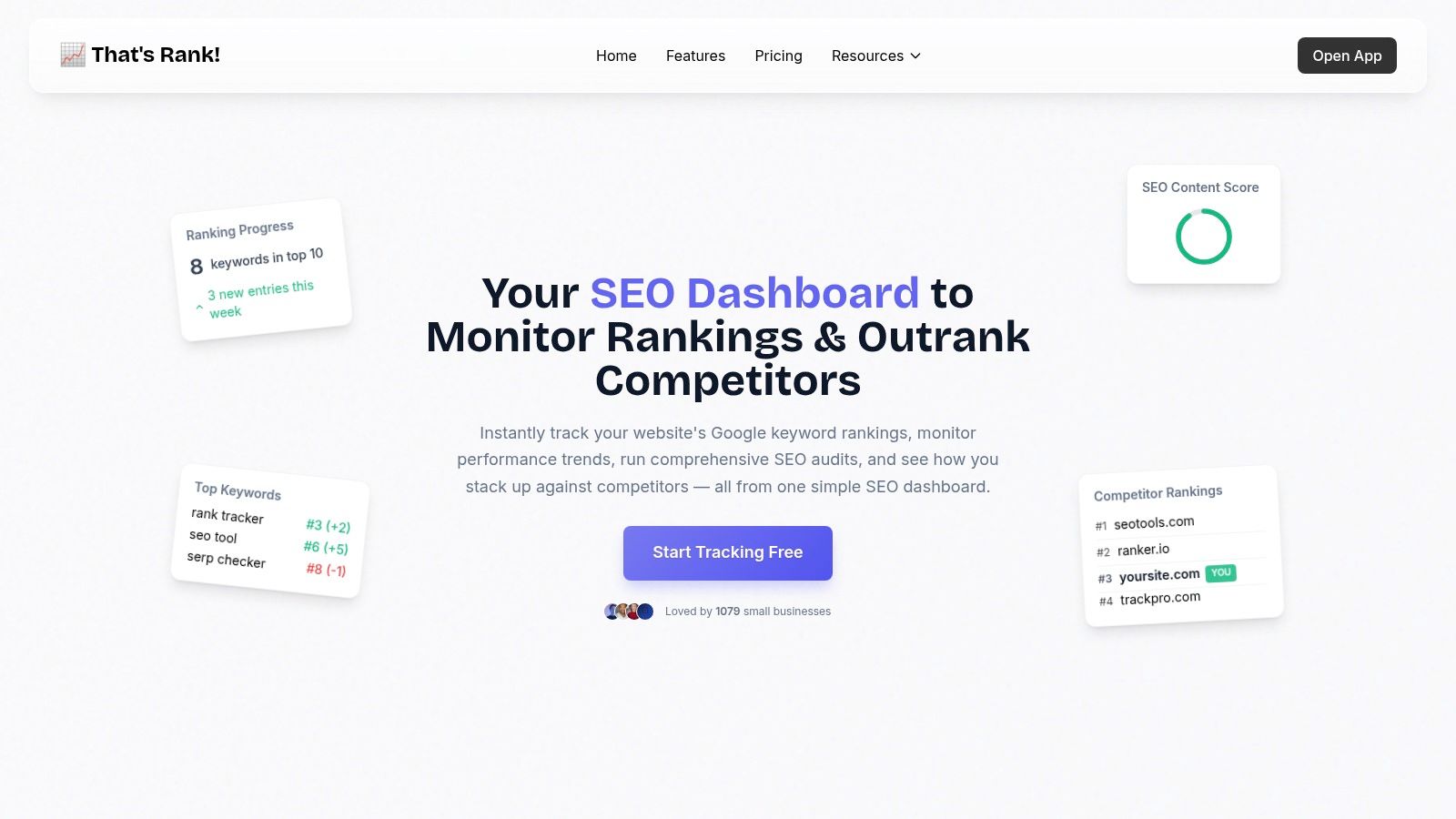
Key Features & Analysis
- Daily Rank Tracking: This is the standout feature. Knowing your precise ranking every 24 hours allows for immediate reaction to algorithm updates, competitor moves, or on-page changes.
- Competitor Monitoring: You can add competitor domains and track their keyword performance side-by-side with your own. This is perfect for identifying gaps in your strategy or noticing when a rival starts ranking for a keyword you're targeting.
- Comprehensive SEO Audits: Beyond tracking, the tool performs on-page SEO audits, flagging technical issues like broken links, missing meta descriptions, or slow page speed that could be hindering your store's visibility.
- White-Label Reporting: Agencies and freelancers will appreciate the ability to generate clean, professional reports for clients without the That's Rank branding, streamlining communication and reinforcing their own brand identity.
Practical Use Case
An e-commerce manager for a Shopify store selling handmade leather goods can use That's Rank to monitor their most valuable keywords like "full-grain leather wallet" and "custom leather belt." By setting up alerts, they receive an email the moment their ranking for "full-grain leather wallet" drops out of the top three. Simultaneously, they can track a major competitor and see if that competitor’s ranking for the same term increased, providing instant, actionable intelligence to guide their response.
| Feature | That's Rank | Many All-in-One Suites |
|---|---|---|
| Primary Focus | Daily Rank Tracking & Audits | Broad SEO (Backlinks, Content, etc.) |
| User Interface | Highly simplified, intuitive | Often complex, requires training |
| Update Frequency | Daily (Automated) | Daily, Weekly, or Manual |
| Pricing Model | Includes a free forever plan | Typically premium-only subscriptions |
Pricing & Access
That's Rank operates on a freemium model, making it accessible to everyone.
- Free Plan: Track 1 domain and 3 keywords, ideal for new blogs or small site owners testing the waters.
- Pro Plans: Paid tiers scale up to accommodate agencies and large e-commerce operations, offering unlimited domain/keyword tracking and advanced features.
Our Takeaway: For e-commerce businesses that need a reliable, no-fuss solution to the critical question "Where do my products rank on Google today?", That's Rank is an unparalleled choice. It masterfully balances powerful, daily data with a user experience that empowers action rather than causing analysis paralysis.
Pros:
- Fresh, reliable data with automatic daily updates.
- Simple, intuitive interface requires no technical expertise.
- Unlimited domain tracking is perfect for competitor analysis.
- Includes a genuinely useful free-forever plan.
Cons:
- Lacks advanced features like backlink analysis or in-depth content optimization tools.
- The free plan is quite limited for anything beyond a single, small project.
Website: https://www.thatisrank.com
2. Ahrefs
Ahrefs is an industry-leading, all-in-one SEO suite that provides an unparalleled depth of data, making it one of the most powerful ecommerce SEO tools available. While often recognized for its legendary backlink index, its true value for online stores lies in its interconnected toolset. Ecommerce managers can leverage Ahrefs to conduct deep competitor analysis, uncover profitable product keywords, and diagnose critical technical SEO issues that might be hindering sales.
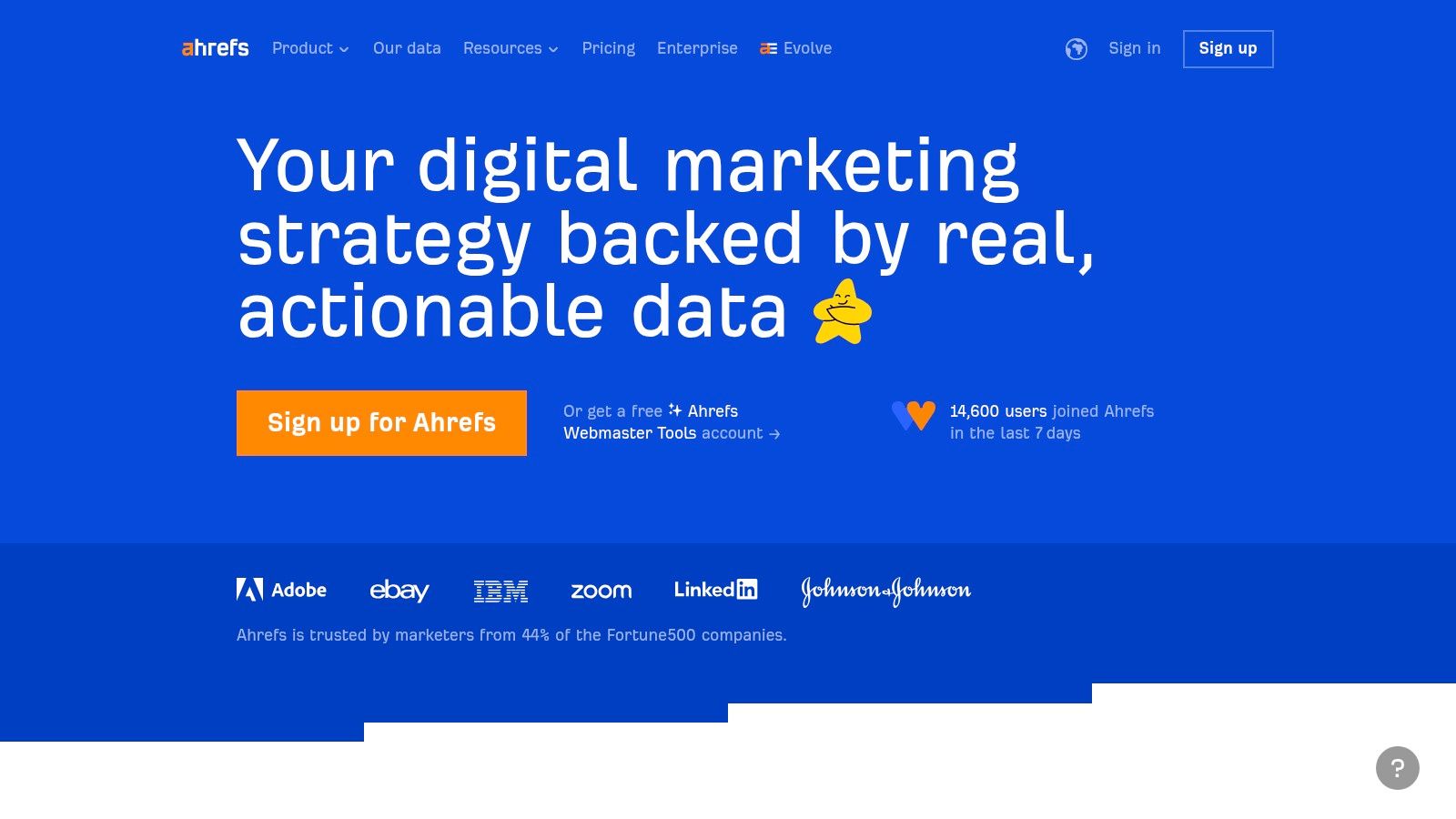
The platform’s strength is its ability to tie different data points together. You can use the Site Explorer to find a competitor's top-performing organic pages, then use the Keywords Explorer to analyze the specific terms driving their traffic, and finally use the Content Gap tool to see which of those keywords you aren't yet targeting. This comprehensive workflow is essential for building a robust and competitive ecommerce SEO strategy. You can learn more about how these insights inform a successful ecommerce SEO strategy on thatisrank.com.
Key Features & Use Cases
- Keyword Explorer: Ideal for finding high-intent commercial keywords for product and category pages. Use the "Questions" filter to discover long-tail keywords for your blog content, addressing customer pain points directly.
- Site Audit: Essential for ecommerce sites with thousands of pages. It quickly identifies issues like broken internal links, slow page speed, or duplicate content on product variations, which can severely impact rankings.
- Rank Tracker: Monitor keyword rankings for your most important product pages across different geographic locations, which is vital for stores with an international customer base.
- Site Explorer: The standout feature. Use it to reverse-engineer a competitor's link-building strategy or identify their most linked-to products to inform your own content and outreach efforts.
| Feature | Ideal For | Pricing |
|---|---|---|
| Data Quality | In-depth competitive analysis and backlink research. | Starts at $99/mo |
| User Interface | SEO professionals and marketing teams needing a robust tool. | |
| Learning Curve | Moderate; beginners may need time to master all features. |
Pros:
- Best-in-class backlink and competitor analysis data.
- User-friendly interface despite its data complexity.
- Constantly updated with new, innovative features.
Cons:
- The pricing can be a significant investment for small businesses or startups.
- The sheer volume of data can be overwhelming for SEO beginners.
Website: https://ahrefs.com/
3. SEMrush
SEMrush is a powerful and versatile all-in-one digital marketing suite that serves as a command center for any serious ecommerce SEO strategy. Known for its vast keyword database and robust competitor analysis features, it allows online store owners to dissect their rivals' strategies, find untapped keyword opportunities, and manage their site's technical health. For ecommerce businesses, SEMrush is one of the most comprehensive ecommerce SEO tools for gaining a competitive edge in crowded markets.
The platform excels at providing a holistic view of your digital footprint, from organic search to paid ads and social media. An ecommerce manager can use the Keyword Magic Tool to find long-tail product queries, then use the On-Page SEO Checker to get actionable recommendations for optimizing product pages. This integration helps streamline workflows and ensures all marketing efforts are aligned. The platform's reporting capabilities are also a major asset, which you can explore further in this guide to SEO reporting tools for agencies on thatisrank.com.
Key Features & Use Cases
- Keyword Magic Tool: Uncover commercial-intent keywords for your product and category pages. Use its advanced filters to narrow down by search intent, question-based queries, and keyword difficulty.
- Site Audit: Crucial for large ecommerce stores. It crawls your site to find and prioritize technical SEO errors like crawlability issues, HTTPS implementation errors, and internal linking problems that hurt user experience and rankings.
- Position Tracking: Track daily keyword ranking changes for your key products and categories at a national, regional, or local level. This is perfect for monitoring the impact of your SEO efforts in specific target markets.
- Competitive Research Toolkit: A core strength. Analyze any competitor's organic traffic, top keywords, backlink profile, and even their advertising strategy to identify weaknesses and opportunities for your own store.
| Feature | Ideal For | Pricing |
|---|---|---|
| Tool Diversity | Holistic digital marketing, from SEO to PPC and content. | Starts at $129.95/mo |
| User Interface | Marketers of all levels, from beginners to experts. | |
| Learning Curve | Low to moderate; core features are intuitive to use. |
Pros:
- Extensive all-in-one feature set covering almost every aspect of digital marketing.
- Intuitive and well-organized user interface that simplifies complex data.
- Excellent for comprehensive keyword research and competitor analysis.
Cons:
- Pricing can be a barrier for small ecommerce businesses or solopreneurs.
- Backlink data, while good, is sometimes considered less comprehensive than direct competitors.
Website: https://www.semrush.com/
4. Moz Pro
Moz Pro is one of the most established and trusted names in the SEO industry, offering a comprehensive suite of tools that are both powerful and exceptionally user-friendly. For ecommerce businesses, Moz Pro excels at simplifying complex SEO tasks, making it an excellent choice for store owners and marketers who need actionable insights without a steep learning curve. It provides a solid foundation for keyword research, on-page optimization, and tracking performance over time.
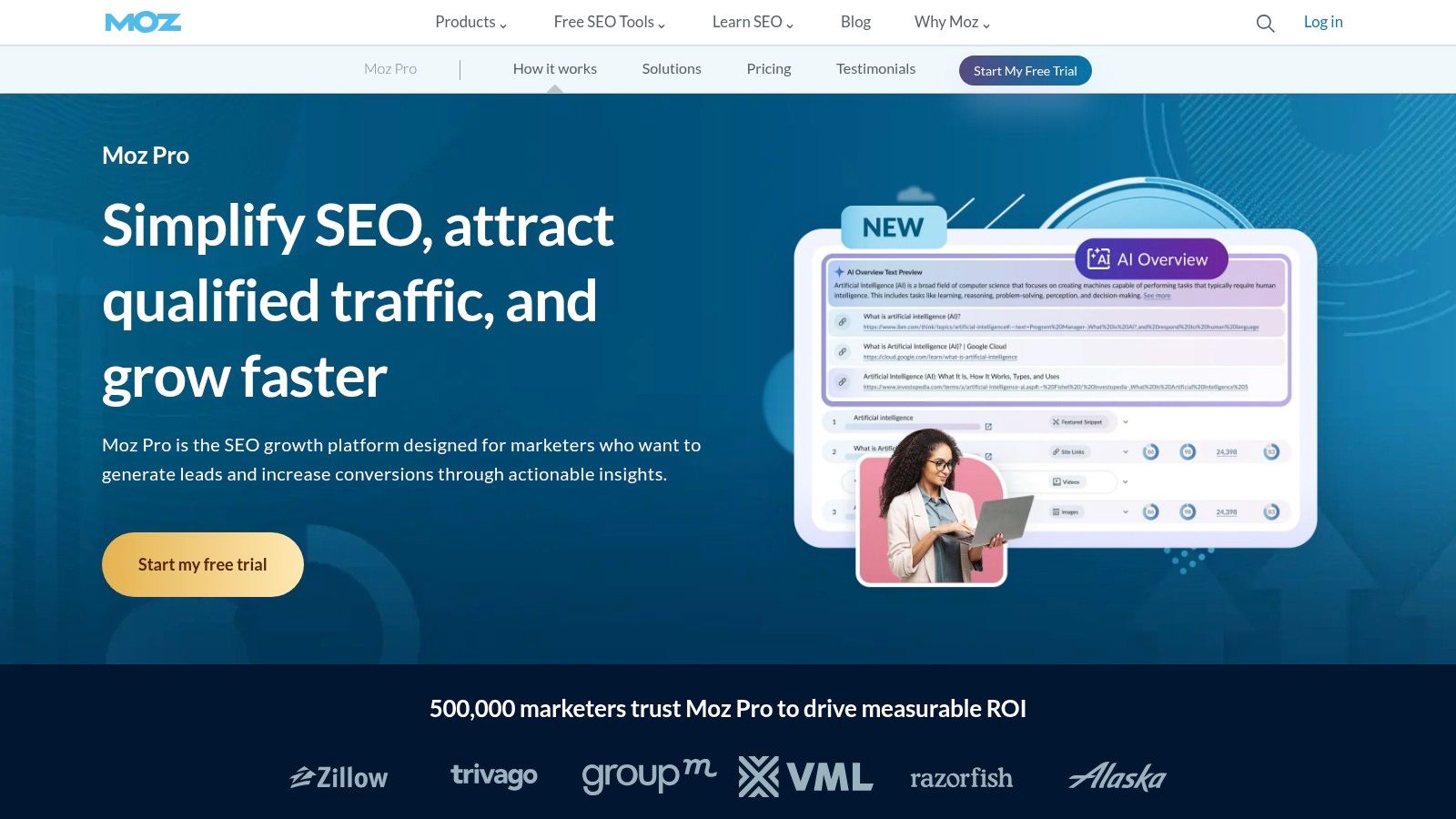
The platform's strength lies in its intuitive design and its focus on education. Moz not only gives you the data but also helps you understand what to do with it through its recommendations and extensive learning resources. For an online store, this means you can quickly use the Page Optimization feature to get a clear checklist of improvements for a product page or leverage the Site Crawl to find and fix technical errors that could be costing you sales. This accessibility makes it a premier choice among ecommerce SEO tools for teams that are still building their technical expertise.
Key Features & Use Cases
- Keyword Explorer: Discover and prioritize keywords for your product and category pages. Its "Organic CTR" and "Priority" scores help you focus on terms that are most likely to drive clicks and conversions.
- Site Crawl: Regularly audit your ecommerce site for critical technical issues like broken redirects or missing title tags. This is vital for large stores with constantly changing product inventories.
- Link Explorer: Analyze your store's backlink profile and uncover link-building opportunities by researching competitors. Use it to find out who links to their top-selling product categories.
- Page Optimization: Get instant, actionable advice on how to improve on-page SEO for specific URLs. Simply enter a page and a target keyword to receive a detailed optimization score and recommendations.
| Feature | Ideal For | Pricing |
|---|---|---|
| Data Quality | Core SEO tasks and understanding fundamental metrics. | Starts at $99/mo |
| User Interface | Beginners and teams wanting an intuitive, easy-to-use tool. | |
| Learning Curve | Low; excellent for those new to dedicated SEO software. |
Pros:
- Extremely user-friendly interface and a gentle learning curve.
- Backed by comprehensive educational resources and a strong community.
- Proprietary metrics like Domain Authority (DA) are industry standards.
Cons:
- The backlink index is less extensive than some direct competitors.
- Pricing can be a hurdle for small businesses on a tight budget.
Website: https://moz.com/products/pro
5. Ubersuggest
Ubersuggest, an SEO tool developed by digital marketing expert Neil Patel, positions itself as a highly accessible and budget-friendly option for those just starting their optimization journey. It's a particularly strong choice for small to medium-sized ecommerce businesses that need core SEO functionality without the complexity or high cost of enterprise-level suites. Ubersuggest simplifies keyword research and competitor analysis into a straightforward, easy-to-navigate interface.
While it may not offer the granular depth of data found in more advanced platforms, its strength lies in providing actionable insights quickly. Ecommerce store owners can use Ubersuggest to discover untapped product keywords, get a top-level view of their competitors' top pages, and receive content ideas to fuel their blog strategy. It's one of the most user-friendly ecommerce SEO tools for newcomers.
Key Features & Use Cases
- Keyword Visualization: Excellent for brainstorming. It presents keyword ideas and data in a visually intuitive way, helping you quickly identify terms with commercial intent for product pages and categories.
- Site Audit: Provides a clear, prioritized list of on-page SEO errors. For an ecommerce site, this can quickly flag critical issues like missing alt text on product images or duplicate meta descriptions across multiple listings.
- Competitor Analysis: Easily see which keywords your direct competitors are ranking for. This is invaluable for finding gaps in your own product page targeting and discovering new market opportunities.
- Content Ideas: Generates a list of popular blog posts related to your primary keywords, helping you create supporting content that attracts potential customers at the top of the sales funnel.
| Feature | Ideal For | Pricing |
|---|---|---|
| Ease of Use | Small businesses and SEO beginners needing straightforward data. | Starts at $29/mo or a lifetime deal option. |
| Core Functionality | Fundamental keyword research and basic site health checks. | |
| Learning Curve | Very low; the interface is designed to be intuitive for all skill levels. |
Pros:
- Extremely affordable pricing, including a compelling lifetime deal.
- Simple, clean user interface that is perfect for beginners.
- Provides solid, actionable data for core SEO tasks.
Cons:
- Backlink data and site crawl limits are less extensive than premium competitors.
- Lacks the advanced filtering and deep analytical features of enterprise tools.
Website: https://neilpatel.com/ubersuggest/
6. Screaming Frog SEO Spider
Screaming Frog SEO Spider is a powerful and flexible website crawler that acts as a foundational technical ecommerce SEO tool. This desktop-based application crawls your entire online store, mimicking how search engine bots see it, to provide a comprehensive audit of onsite SEO factors. For ecommerce sites with potentially thousands of product, category, and blog pages, this tool is indispensable for identifying critical technical issues that can suppress rankings and harm the user experience.
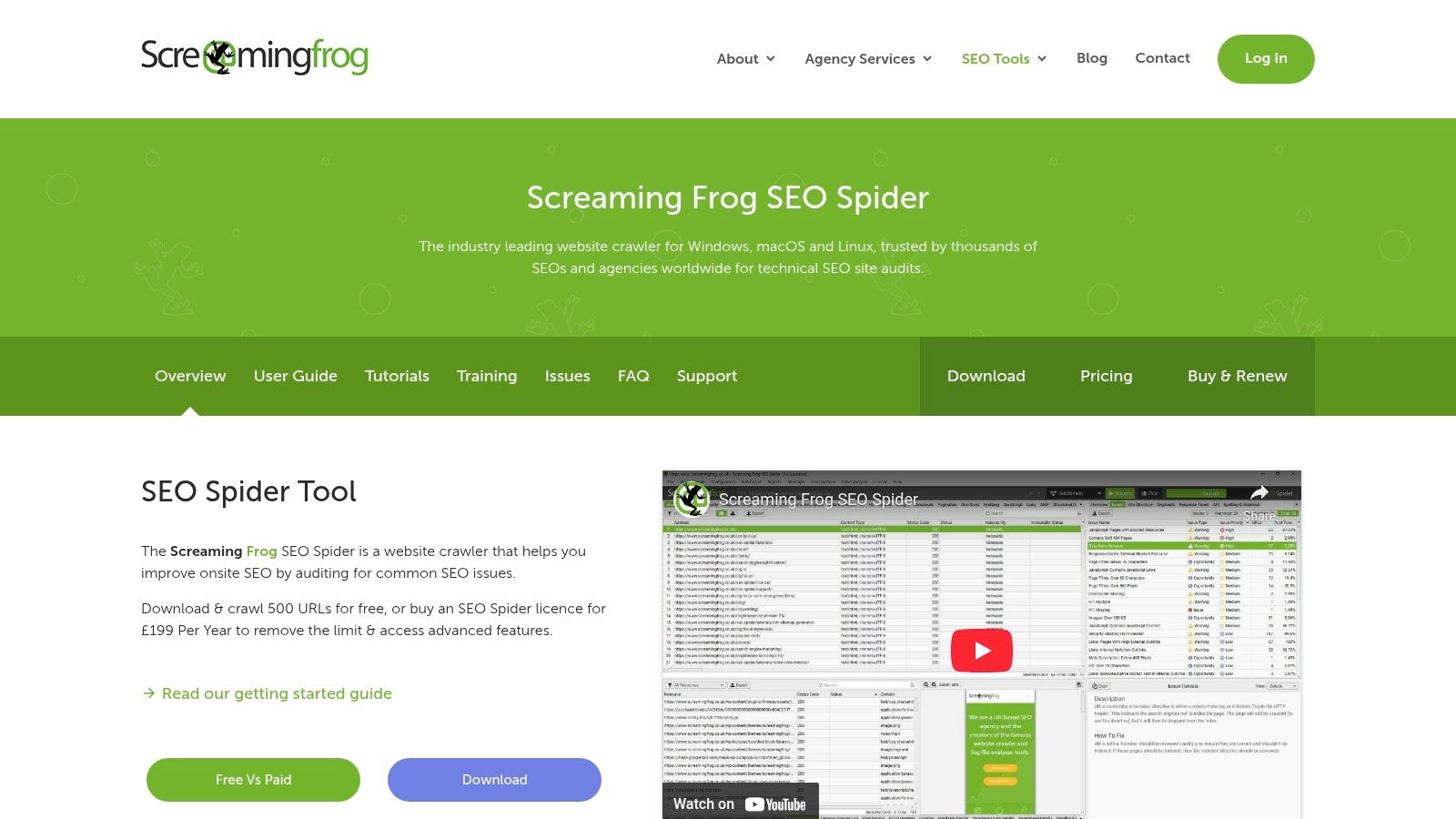
Unlike cloud-based suites, Screaming Frog gives you raw, unfiltered data right on your machine, allowing for deep, customizable analysis. You can quickly find broken links leading to 404 pages, pinpoint duplicate product descriptions across multiple URLs, or audit your meta titles and descriptions in bulk. This granular level of control is perfect for executing complex technical SEO tasks, such as preparing for a site migration or performing a large-scale content audit.
Key Features & Use Cases
- Find Broken Links & Redirects: Instantly crawl your site to find 404 errors and redirect chains that hurt user experience and waste crawl budget. This is vital for maintaining a clean site structure.
- Analyze Page Titles & Meta Data: Export all your page titles and meta descriptions into a spreadsheet to identify those that are too long, too short, missing, or duplicated across your store.
- Generate XML Sitemaps: Quickly create an accurate XML sitemap, a crucial feature for large ecommerce websites to ensure search engines can discover all your important product and category pages.
- Identify Duplicate Content: Use the duplicate content filter to find pages with identical or near-identical content, a common issue with product variations and faceted navigation on ecommerce sites.
| Feature | Ideal For | Pricing |
|---|---|---|
| Data Quality | In-depth technical site audits and data extraction. | Free & Paid versions |
| User Interface | SEO professionals and technical marketers needing deep data. | |
| Learning Curve | High; the interface is data-heavy and can be intimidating. |
Pros:
- Extremely comprehensive and detailed technical SEO analysis.
- A generous free version allows crawling up to 500 URLs.
- Highly customizable crawls and data extraction capabilities.
Cons:
- The data-rich interface can be complex and overwhelming for beginners.
- Being a desktop application, it can be resource-intensive on your computer for very large sites.
Website: https://www.screamingfrog.co.uk/seo-spider/
7. Yoast SEO
For ecommerce businesses built on WordPress and WooCommerce, Yoast SEO is often the first and most fundamental optimization plugin installed. It acts as an on-page SEO guide, directly integrated into your WordPress editor, making it one of the most accessible ecommerce SEO tools for store owners and content creators. Its primary strength is demystifying on-page SEO, providing real-time feedback and clear, actionable steps to improve product pages, category pages, and blog posts.
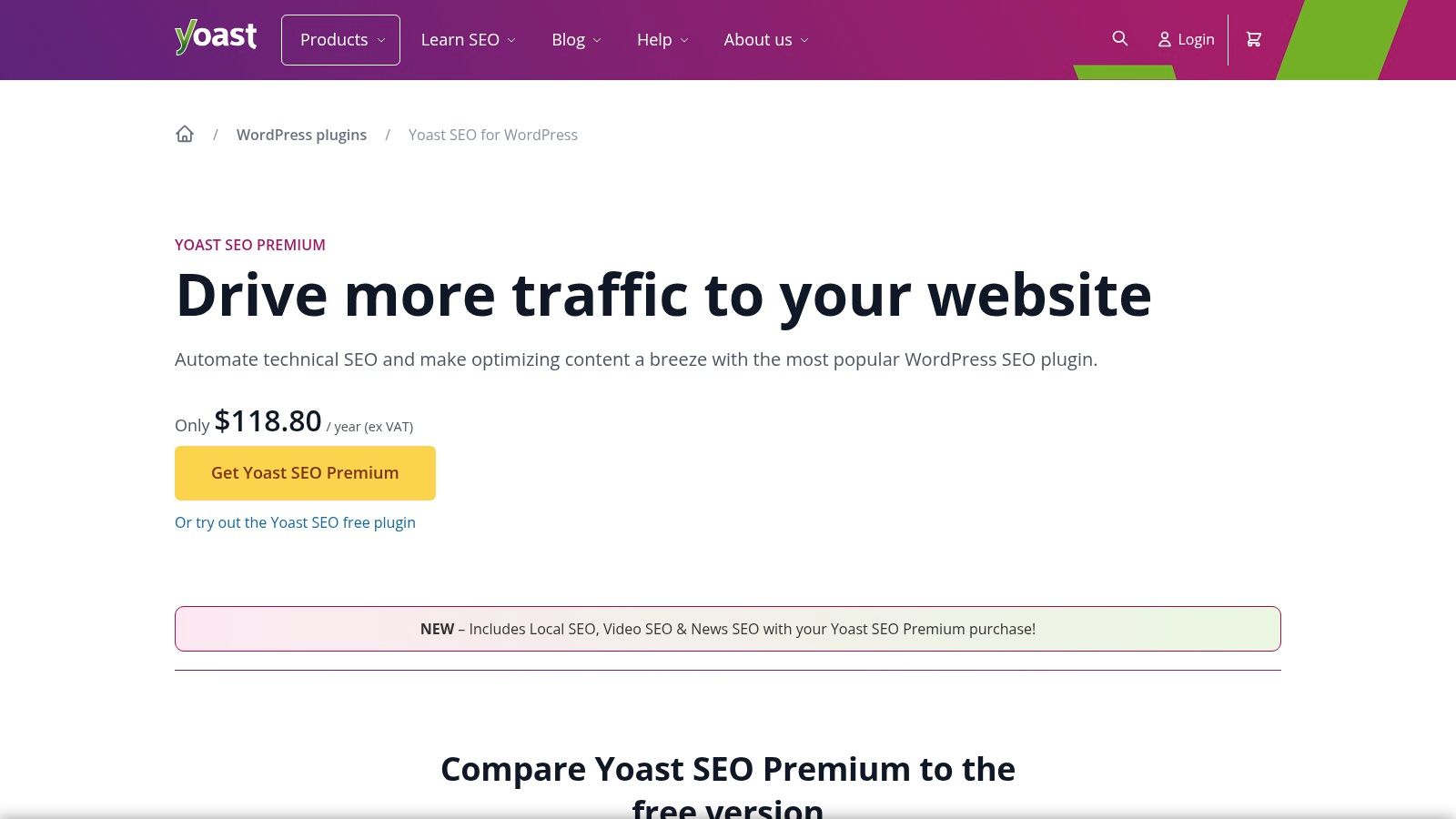
Yoast simplifies complex tasks that are crucial for ecommerce success, such as generating XML sitemaps and creating templates for meta titles and descriptions. This ensures consistency across thousands of product listings. While it doesn't offer the deep competitive analysis of a standalone suite, its focus on content and technical fundamentals makes it an indispensable starting point for any WordPress-based online store aiming to improve its search visibility.
Key Features & Use Cases
- Real-time Content Analysis: As you write product descriptions, Yoast provides instant feedback on keyword usage, content length, and internal linking, helping you optimize pages before they even go live.
- Meta Title and Description Templating: Set up automated, variable-based templates for product and category pages to ensure all your pages have optimized, unique metadata without manual effort.
- XML Sitemap Generation: Automatically creates and updates a comprehensive sitemap for your store, ensuring search engines can efficiently find and index all your products, including new additions.
- Readability Check: Analyzes your content's readability using the Flesch Reading Ease score, helping you write compelling product copy that is easy for customers to understand and engage with.
| Feature | Ideal For | Pricing |
|---|---|---|
| On-Page Guidance | WordPress/WooCommerce users needing guided SEO. | Freemium; Premium starts at $99/year |
| User Interface | Beginners to intermediate users; content creators. | |
| Learning Curve | Low; very intuitive and well-documented. |
Pros:
- Extremely user-friendly with a clear traffic-light system for feedback.
- Seamless integration with the WordPress and WooCommerce environment.
- Comprehensive free version covers most essential on-page SEO needs.
Cons:
- More advanced features (like internal linking suggestions) are behind a paywall.
- Can be resource-intensive, potentially slowing down very large websites.
Website: https://yoast.com/wordpress/plugins/seo/
8. KWFinder by Mangools
KWFinder excels at making keyword research accessible and actionable, earning its spot as one of the best ecommerce SEO tools for businesses focused on finding profitable niches. Its core strength is identifying long-tail keywords with low competition, a crucial strategy for new or smaller online stores trying to gain a foothold against established giants. The platform presents complex data, like keyword difficulty and search volume, in an incredibly intuitive and visually appealing interface.
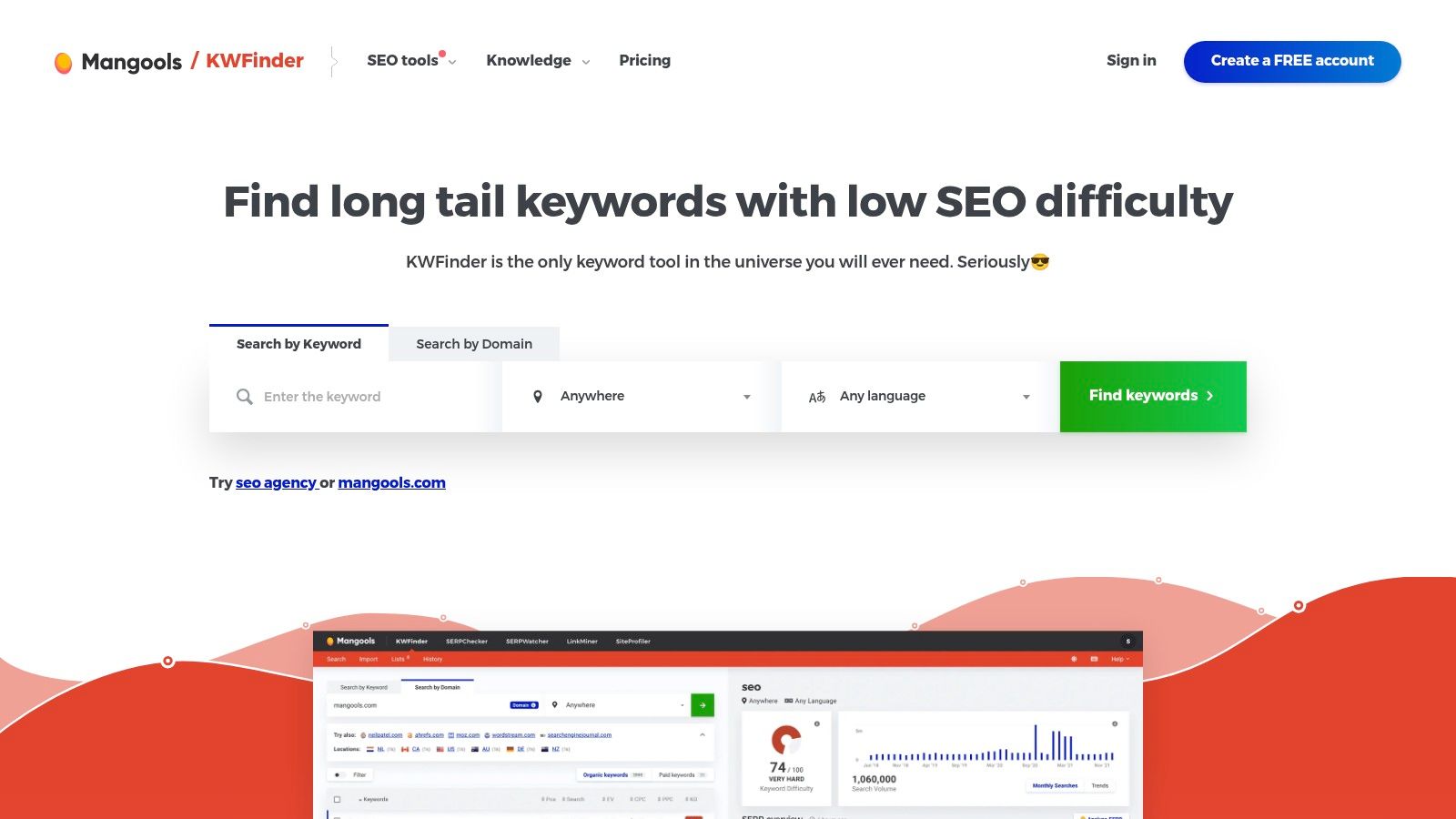
For an ecommerce manager, KWFinder streamlines the process of discovering untapped product or category page keywords. Instead of getting lost in spreadsheets, you can quickly find high-intent phrases, analyze the current search engine results page (SERP) competition, and even find what keywords your competitors rank for, all within one clean dashboard. This focused approach helps in building a content strategy that targets achievable wins. You can also apply these insights to a broader competitive strategy by performing a keyword gap analysis on thatisrank.com to see where your rivals are outperforming you.
Key Features & Use Cases
- Keyword Suggestions: Enter a seed term like "eco-friendly dog toys" to get hundreds of relevant long-tail variations. This is perfect for generating ideas for new product lines, blog posts, and category page optimizations.
- Accurate Keyword Difficulty Score: KWFinder’s signature feature is its highly reliable difficulty score (0-100), which helps you prioritize keywords you can realistically rank for, saving time and resources.
- SERP Analysis: Directly within the tool, you can see the top-ranking pages for any keyword, along with key metrics like Domain Authority and backlink counts, allowing for quick competitive assessment.
- Local Keyword Research: Filter keyword data by city, state, or country, which is essential for ecommerce businesses that also have a physical presence or target specific geographic markets.
| Feature | Ideal For | Pricing |
|---|---|---|
| Ease of Use | Beginners and small businesses needing straightforward keyword data. | Starts at $29/mo |
| Data Focus | Finding low-competition, long-tail keywords. | |
| Learning Curve | Low; the interface is one of the most user-friendly available. |
Pros:
- Excellent user interface that simplifies keyword research.
- Affordable pricing makes it accessible for startups and SMBs.
- The keyword difficulty metric is widely considered to be very accurate.
Cons:
- Lacks the comprehensive features of an all-in-one SEO suite like Ahrefs or Semrush.
- Data update frequency and backlink index are smaller than top-tier competitors.
Website: https://mangools.com/kwfinder/
9. Google Search Console
Google Search Console is the non-negotiable, foundational tool for any website owner, but it's especially critical in the world of ecommerce SEO. As a free service directly from Google, it offers an unfiltered view of how the search engine sees and ranks your online store. It's not an optional tool; it's the official communication channel between your ecommerce site and Google, providing indispensable data on performance, indexability, and overall site health.
Unlike other ecommerce SEO tools that estimate traffic, Search Console provides the actual data. For an online store, this means you can see the exact search queries customers use to find your product pages, identify underperforming categories, and discover which products are gaining visibility. This direct insight is crucial for diagnosing indexing problems, monitoring the impact of site changes, and understanding your store’s true organic search footprint without any third-party interpretation.
Key Features & Use Cases
- Performance Report: The core of the tool. Use it to find high-impression, low-click-through-rate (CTR) keywords for your product pages, indicating an opportunity to improve titles and meta descriptions to drive more traffic.
- Index Coverage Report: Essential for large ecommerce sites. It tells you exactly which pages Google has indexed and which it hasn't, helping you quickly spot issues with canonical tags on product variations or noindexed category pages.
- URL Inspection Tool: Provides a real-time look at how Googlebot sees a specific product URL. Use this to troubleshoot why a new product isn't showing up in search or to request re-indexing after updating product details.
- Sitemaps: Submit your product, category, and blog sitemaps directly to Google to ensure it can discover and crawl all of your important pages efficiently.
| Feature | Ideal For | Pricing |
|---|---|---|
| Data Source | Gaining direct, unfiltered performance data from Google Search. | Free |
| User Interface | All website owners, from beginners to advanced SEO professionals. | |
| Learning Curve | Low for basic reports; moderate for advanced troubleshooting. |
Pros:
- Completely free to use with no data limitations.
- Provides the most accurate search performance data available.
- Directly helps identify and resolve technical and indexing issues.
Cons:
- Data is limited to Google's search engine only.
- The interface can be intimidating for absolute beginners who are new to SEO concepts.
Website: https://search.google.com/search-console/
10. Helium 10
While many ecommerce SEO tools focus on Google, Helium 10 carves out its niche by being the definitive optimization suite for the world's largest product search engine: Amazon. It is an indispensable toolkit for any brand selling on the Amazon marketplace, providing a powerful array of software designed to dominate product listings, research profitable niches, and track performance directly within the Amazon ecosystem. For sellers, optimizing for Amazon's A9 algorithm is just as critical as ranking on Google, and Helium 10 provides the data to do it effectively.
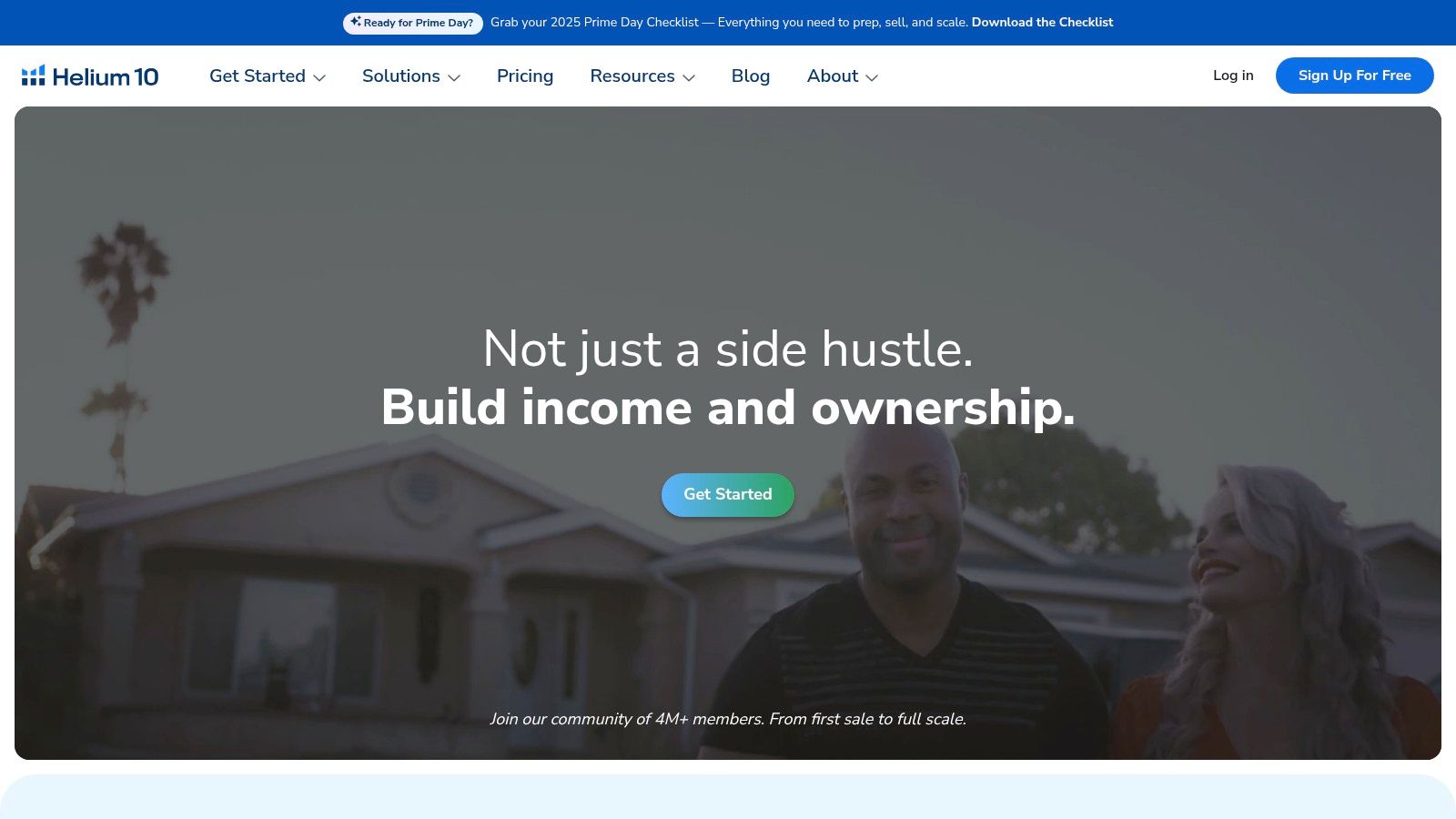
The platform’s power comes from its laser focus on the Amazon selling journey. Instead of general SEO metrics, it provides Amazon-specific data points like sales estimates, keyword search volume within Amazon, and competitor inventory levels. This allows sellers to move beyond guesswork and make data-driven decisions about product sourcing, listing copy, and PPC campaigns, making it a crucial ecommerce SEO tool for anyone serious about marketplace success.
Key Features & Use Cases
- Cerebro (Reverse ASIN Search): Enter a competitor’s product ASIN to see all the keywords they rank for. This is perfect for discovering high-volume, relevant keywords to add to your own product listing's title, bullet points, and backend search terms.
- Magnet (Amazon Keyword Research): Find thousands of relevant keywords directly from the Amazon search bar. Use it to validate product ideas and find long-tail keywords that shoppers are actively using to find products like yours.
- Black Box (Product Research): A comprehensive product discovery tool. Filter products by category, monthly revenue, price, and review count to uncover underserved niches and high-demand product opportunities.
- Listing Analyzer: Audits your own or a competitor's listing against best practices, providing a score and actionable recommendations to improve visibility and conversion rate.
| Feature | Ideal For | Pricing |
|---|---|---|
| Data Quality | Amazon-specific keyword, product, and competitor analysis. | Starts at $29/mo |
| User Interface | Amazon sellers, from beginners to advanced FBA experts. | |
| Learning Curve | Low to moderate; very intuitive for those familiar with Amazon. |
Pros:
- All-in-one suite specifically designed for Amazon sellers.
- Extremely accurate product and keyword data for the Amazon platform.
- User-friendly interface and helpful Chrome extension.
Cons:
- Almost exclusively focused on Amazon, offering little value for other platforms.
- Can become expensive as you scale and need more advanced features.
Website: https://www.helium10.com/
11. SurferSEO
SurferSEO is a specialized, data-driven content intelligence tool that excels at on-page optimization. For ecommerce stores, it takes the guesswork out of creating product descriptions, category pages, and blog posts that rank. By analyzing over 500 different ranking factors across the top-performing pages for a given keyword, Surfer provides a clear, actionable roadmap for what your content needs to include, from keyword density and NLP terms to optimal word count and heading structure.
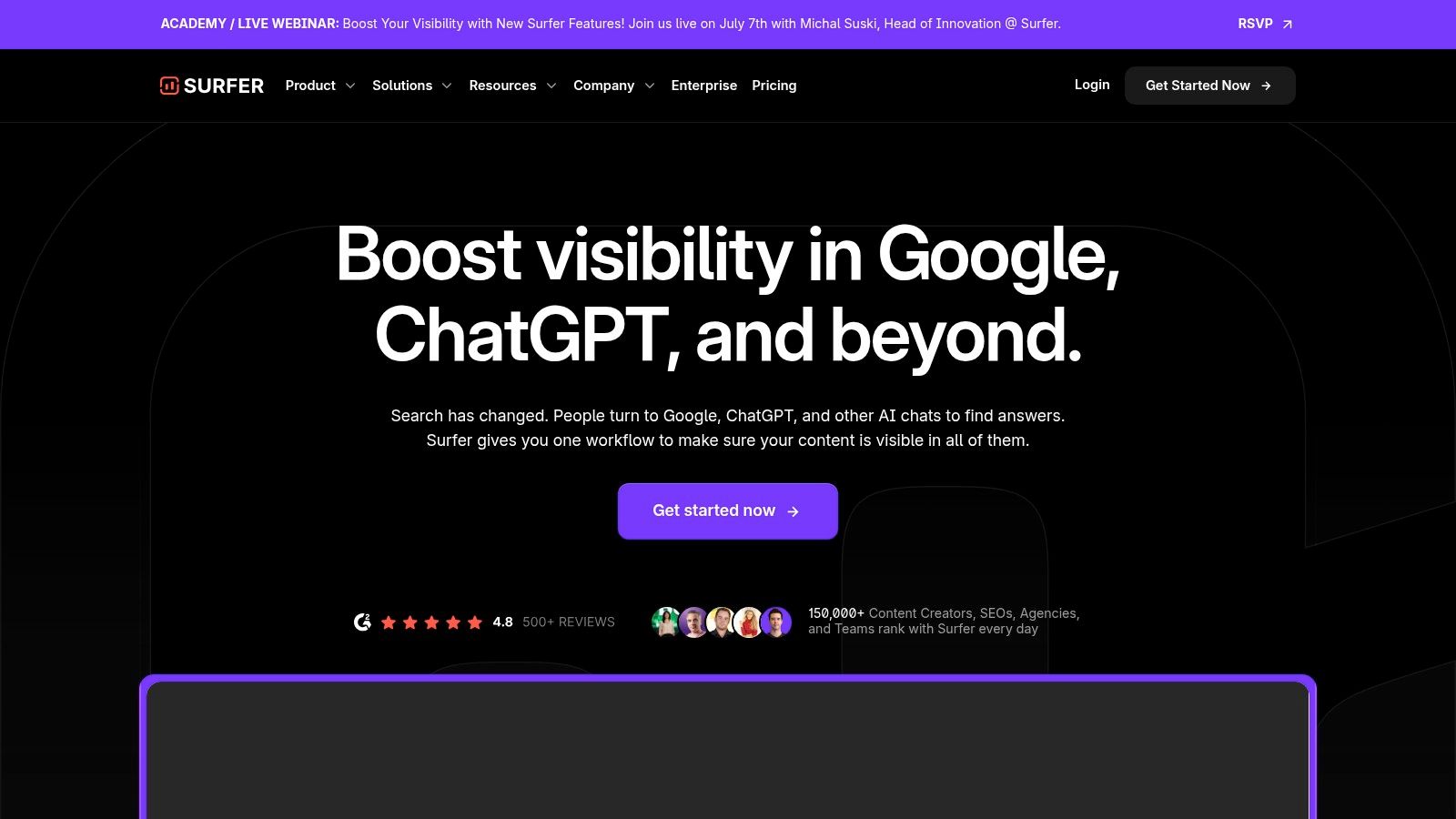
Its core strength lies in translating complex SERP analysis into a simple, real-time score within its Content Editor. This makes it an invaluable asset for ecommerce teams looking to scale content production without sacrificing quality. Instead of guessing what Google wants, you can build perfectly optimized pages from the ground up, giving your product listings a significant competitive edge in crowded markets. It stands out among ecommerce SEO tools for its laser focus on content performance.
Key Features & Use Cases
- Content Editor: The flagship feature. Use it to write new product descriptions or optimize existing ones against data-driven guidelines. It provides real-time feedback, making it easy for writers of any skill level to produce SEO-optimized content.
- SERP Analyzer: Essential for understanding the competitive landscape. Before creating content for a new product category, analyze the top results to identify common elements, content length, and key topics you must cover.
- Audit Tool: Perfect for refreshing underperforming pages. Run an audit on an old blog post or category page to get a list of specific, actionable changes needed to improve its ranking potential.
- Keyword Research: Discover clusters of related keywords and important NLP (Natural Language Processing) terms to ensure your content is comprehensive and covers the topic with authority.
| Feature | Ideal For | Pricing |
|---|---|---|
| Data Quality | On-page content optimization and SERP analysis. | Starts at $89/mo |
| User Interface | Content writers and SEOs focused on content performance. | |
| Learning Curve | Low; the Content Editor is intuitive for immediate use. |
Pros:
- Provides clear, data-backed recommendations for content creation.
- Extremely user-friendly interface with a gentle learning curve.
- Seamlessly integrates with tools like Google Docs, Jasper, and WordPress.
Cons:
- Primarily focused on on-page SEO; lacks broader technical or off-page features.
- Pricing can be a stretch for small businesses or individual store owners.
Website: https://surferseo.com/
12. SpyFu
SpyFu is a competitive intelligence tool designed to reveal the marketing formula of your most successful competitors. For ecommerce businesses, it acts as a shortcut to understanding what keywords, ads, and content strategies are already working in your niche. Instead of starting from scratch, you can use SpyFu to analyze a competitor’s domain and instantly see their most profitable organic keywords and paid ad campaigns, making it one of the most direct ecommerce SEO tools for strategic planning.
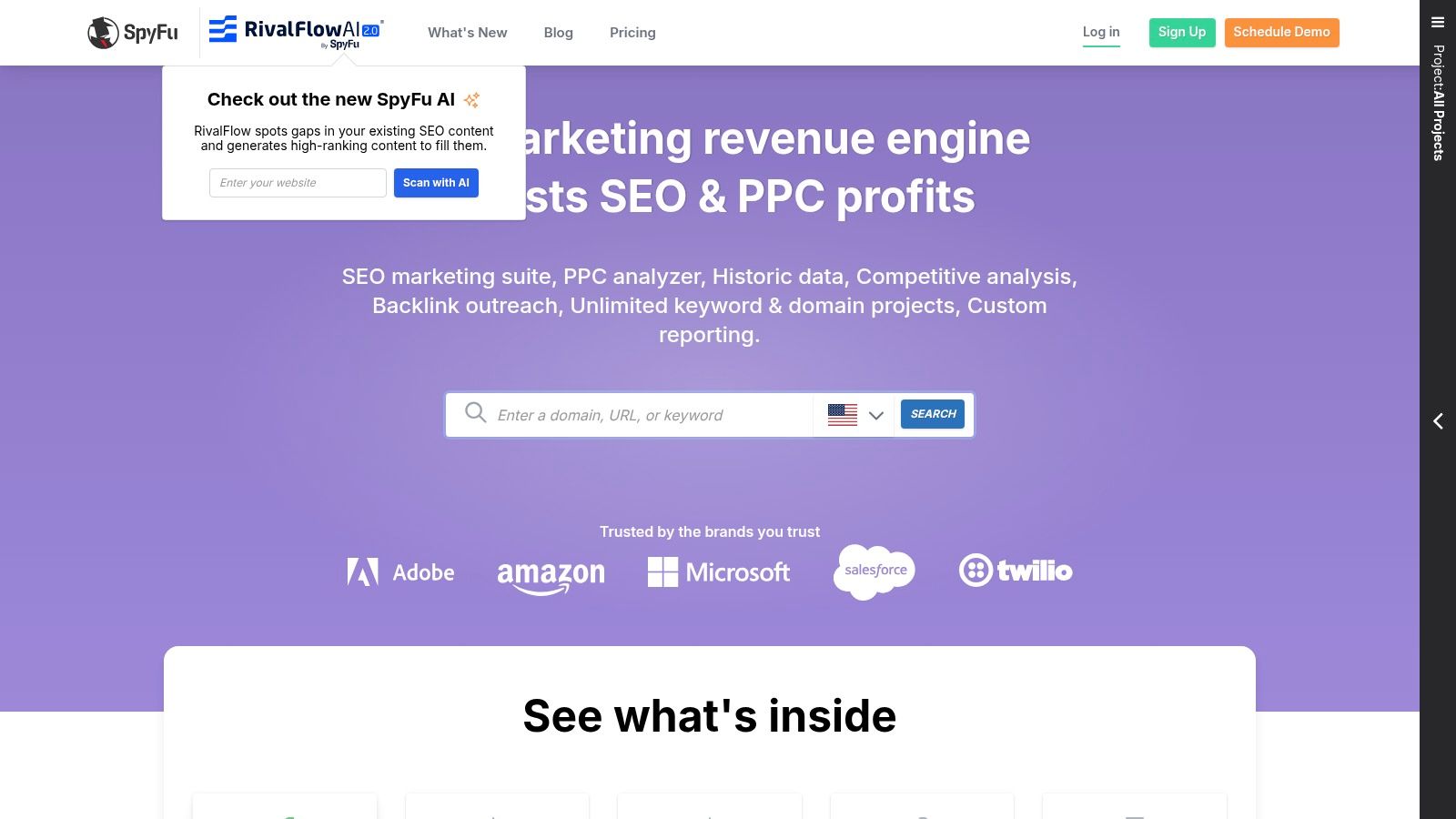
The platform excels at providing actionable data without a steep learning curve. An online store owner can quickly identify a competitor's top product and category pages driving organic traffic, then explore the exact keywords those pages rank for. This insight is invaluable for optimizing your own product descriptions, category text, and blog content to capture high-intent traffic and outmaneuver the competition in search results.
Key Features & Use Cases
- Competitor Keyword Analysis: Enter a competitor's URL to get a complete list of their organic keywords. Use this to find gaps in your own keyword strategy and discover new product or category page opportunities.
- PPC Research: See the exact ad copy and keywords your competitors are bidding on in Google Ads. This can inspire your own PPC campaigns and help you find profitable keywords to target organically.
- Backlink Analysis: While not as deep as specialized tools, it helps you find the types of sites that link to your competitors, providing a solid starting point for your link-building outreach.
- Rank Tracking: Monitor your keyword positions over time and compare your performance directly against key competitors to track the impact of your SEO efforts.
| Feature | Ideal For | Pricing |
|---|---|---|
| Competitive Focus | Reverse-engineering competitor SEO and PPC strategies. | Starts at $39/mo |
| User Interface | Beginners and marketers who need quick, actionable insights. | |
| Learning Curve | Low; the interface is intuitive and focused on core tasks. |
Pros:
- Extremely affordable, offering great value for its price.
- User-friendly interface makes competitor research fast and simple.
- Provides a strong blend of both organic (SEO) and paid (PPC) data.
Cons:
- Data may not be as comprehensive or fresh as more expensive, all-in-one suites.
- Primarily focused on competitor analysis, with limited on-page or technical SEO features.
Website: https://www.spyfu.com/
Ecommerce SEO Tools Feature Comparison
| Tool | Core Features / Capabilities | User Experience / Quality ★ | Value Proposition 💰 | Target Audience 👥 | Unique Selling Points ✨ |
|---|---|---|---|---|---|
| 🏆 That's Rank | Daily Google rank tracking, unlimited domains, SEO audits | ★★★★☆ Easy & intuitive | 💰 Free plan + scalable tiers | Businesses, agencies, freelancers | Automated alerts, white-label reports |
| Ahrefs | Keyword research, backlink analysis, site audit | ★★★★☆ User-friendly | 💰 Higher cost | eCommerce, marketers, SEO pros | Extensive backlink data |
| SEMrush | SEO, PPC, content marketing, competitor analysis | ★★★★☆ Intuitive | 💰 Premium pricing | Agencies, enterprises, eCommerce | All-in-one marketing suite |
| Moz Pro | Keyword explorer, site crawl, link analysis | ★★★☆☆ User-friendly | 💰 Mid-high pricing | SMBs, marketers, SEO beginners | Strong community & resources |
| Ubersuggest | Keyword suggestions, site audit, competitor analysis | ★★★☆☆ Easy to use | 💰 Affordable | Small to medium businesses | Cost-effective, regular updates |
| Screaming Frog SEO Spider | Technical SEO crawler, broken links, duplicate content | ★★★☆☆ Powerful but complex | 💰 Free limited + paid | SEO specialists, technical teams | Deep technical SEO analysis |
| Yoast SEO | Content analysis, XML sitemaps, meta templates | ★★★★☆ User-friendly plugin | 💰 Free + premium options | WordPress site owners | Real-time content optimization |
| KWFinder by Mangools | Long-tail keyword research, SERP analysis | ★★★★☆ Intuitive | 💰 Affordable | Niche marketers, small businesses | Accurate keyword difficulty |
| Google Search Console | Performance reports, index coverage, URL inspection | ★★★☆☆ Direct from Google | 💰 Free | All website owners | Official data & indexing tools |
| Helium 10 | Product & keyword research, listing optimization | ★★★★☆ User-friendly | 💰 Premium pricing | Amazon sellers | Amazon-focused tools |
| SurferSEO | On-page content optimization, SERP analysis | ★★★★☆ Data-driven | 💰 Premium pricing | Content marketers, SEO pros | NLP-powered content suggestions |
| SpyFu | Competitor keyword & PPC analysis, rank tracking | ★★★☆☆ Affordable | 💰 Affordable | Competitor-focused marketers | PPC + SEO insights |
Choosing the Right Ecommerce SEO Tools to Drive Your Growth
We've explored a comprehensive landscape of the industry's leading ecommerce SEO tools, from all-in-one powerhouses like Ahrefs and SEMrush to specialized solutions like Helium 10 for Amazon sellers and SurferSEO for content optimization. The journey through this diverse toolkit reveals a crucial truth: there is no single "best" tool for every online store. The ideal solution depends entirely on your specific business goals, budget, technical expertise, and current stage of growth.
Navigating this ecosystem can feel overwhelming, but making an informed decision is the first step toward a more strategic, data-driven SEO approach. A small business owner just starting might find immense value in the accessibility of Ubersuggest or the foundational insights from Google Search Console. In contrast, an established enterprise with a dedicated marketing team will likely require the granular data, competitive intelligence, and extensive feature sets offered by platforms like Moz Pro or SEMrush to maintain their competitive edge.
Key Takeaways for Selecting Your SEO Toolkit
To synthesize the information we've covered, let's distill the core principles for building your ideal tech stack. Your selection process should be a strategic exercise, not a random collection of subscriptions.
- Start with Your Primary Goal: Are you focused on fixing technical SEO issues? Then a tool like Screaming Frog is non-negotiable. Is your main priority to dominate specific product keywords? KWFinder's simplicity or Ahrefs' deep keyword data would be a better fit. Define the problem you're trying to solve first.
- Acknowledge Your Resources: Be realistic about your budget and, just as importantly, your time. A complex tool is useless if your team lacks the time or training to leverage its advanced features. Sometimes, a more straightforward, user-friendly tool provides a much higher return on investment.
- Don't Underestimate Free Tools: Google Search Console is the most critical tool in your arsenal, and it's completely free. It provides direct, unfiltered data from the source. Before you invest heavily in paid platforms, ensure you have fully mastered GSC's capabilities to diagnose indexing problems, track performance, and understand how users find your site.
- Embrace Specialization: You don't need one tool to do everything. A powerful strategy often involves combining a broad, all-in-one platform with a specialized tool. For example, you could use SEMrush for overall site audits and rank tracking while using SurferSEO to perfect the on-page optimization of your most important category and product pages.
Actionable Next Steps for Your Ecommerce Store
Information without action is just noise. To move forward, you need a clear plan. Here’s how to translate the insights from this guide into tangible progress for your online business.
- Conduct a Self-Audit: Before subscribing to any new ecommerce SEO tools, evaluate your current situation. What are your biggest SEO challenges right now? Is it low organic traffic, poor keyword rankings for top products, or technical site errors? Write down your top three pain points.
- Match Your Needs to a Tool: Refer back to our list. If your primary pain point is identifying profitable keywords with low competition, a tool like KWFinder is an excellent starting point. If you're struggling with thin content on product pages, a content optimization tool like SurferSEO should be at the top of your list.
- Utilize Free Trials: Nearly every paid tool we've discussed offers a free trial or a limited free version. Take advantage of this. Use the trial period to tackle one of your specific pain points. This hands-on experience is the best way to determine if a tool's workflow and data are a good fit for you.
- Implement and Measure: Choose one or two tools to start with. Integrate them into your workflow and set clear, measurable goals. For instance, "I will use this tool to increase organic traffic to my top 10 product pages by 15% in the next quarter."
Building a successful ecommerce business is a marathon, not a sprint. The right ecommerce SEO tools are your running shoes, your water bottle, and your map, they are essential equipment that makes the journey faster, more efficient, and ultimately more successful. By choosing wisely and committing to a data-informed strategy, you can unlock new levels of growth, connect with more customers, and build a resilient online brand that thrives in a competitive digital marketplace.
Are you tired of manually checking your keyword rankings every day? For ecommerce stores that need simple, reliable, and affordable rank tracking, That's Rank offers a focused solution without the complexity of an all-in-one suite. Start tracking the keywords that matter most to your bottom line and get clear, actionable reports delivered right to your inbox with That's Rank.